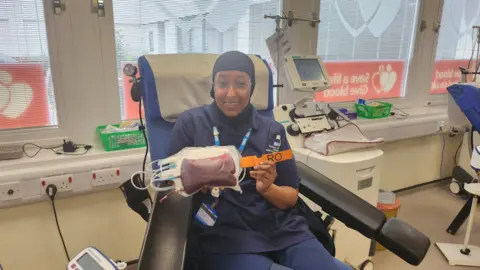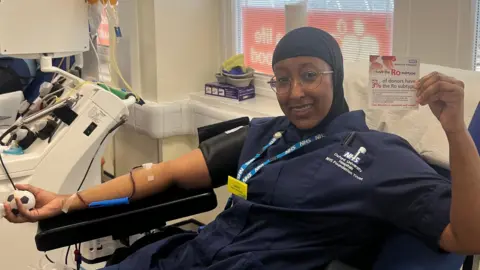'I didn't realise how valuable my blood was'
 NHS Blood and Transplant
NHS Blood and Transplant"When I found out I have a valuable blood type, I felt special and motivated to donate more."
Amino Ali, a renal nurse at Oxford University Hospitals, is encouraging people from black communities to embrace blood donation.
When she gave blood for the first time she discovered she had the rare Ro subtype, most common in people of black heritage.
It is also in high demand for the treatment of patients with the rare blood disorder sickle cell disease.
Ms Ali first gave blood last November at the local Oxford donor centre at the John Radcliffe Hospital.
"My journey of wanting to donate blood initially started off with me being a nurse and seeing the shortage of blood supplies, the delays, the impact it had on my patients," she told the BBC.
'Break the misconceptions'
“I've always wanted to donate, but I never knew how. It wasn't until I discovered how close the donation centre was to where I was working that I took the first step.
"It only took about fifteen minutes to actually donate the blood, and the process was so quick and easy – so different to what I’d expected.”
The NHS said it "urgently" needed more black heritage donors.
Ms Ali said: "I didn't realise how valuable my blood was until I saw the importance placed on my blood type by staff at the donor centre.
"It's fulfilling to know that every donation I make could save up to three lives."
More than 55% of black people in the UK have the Ro subtype, compared to 2% of the general population.
 NHS Blood and Transplant
NHS Blood and TransplantSpeaking to BBC Radio Oxford she said: "As an individual who comes from a black background I know there are misconceptions that surround donating blood.
"But I would urge anybody who’s listening and may be considering to donate to do your own research first and then go ahead and book the appointment, which is basically what I did.
"There are many people of black heritage who are in need of regular blood transfusions for conditions like sickle cell and unfortunately there aren’t many of us coming forward, so I’m hoping that in time we can break the misconceptions in order to allow us to donate more to help save more lives."
Ms Ali aims to now continue making regular donations around her work schedule.
She also wants to donate plasma at the dedicated donor centre in Reading, one of only three in the country.
The NHS needs up to 200,000 new blood donors each year to replace those who stop donating, and to ensure it has the right mix of blood groups.
The four main groups are O, A, B, and AB.
NHS Blood and Transplant needs to collect 1.45 million units of blood each year to meet the needs of patients across England.
You can follow BBC Oxfordshire on Facebook, X (Twitter), or Instagram.
